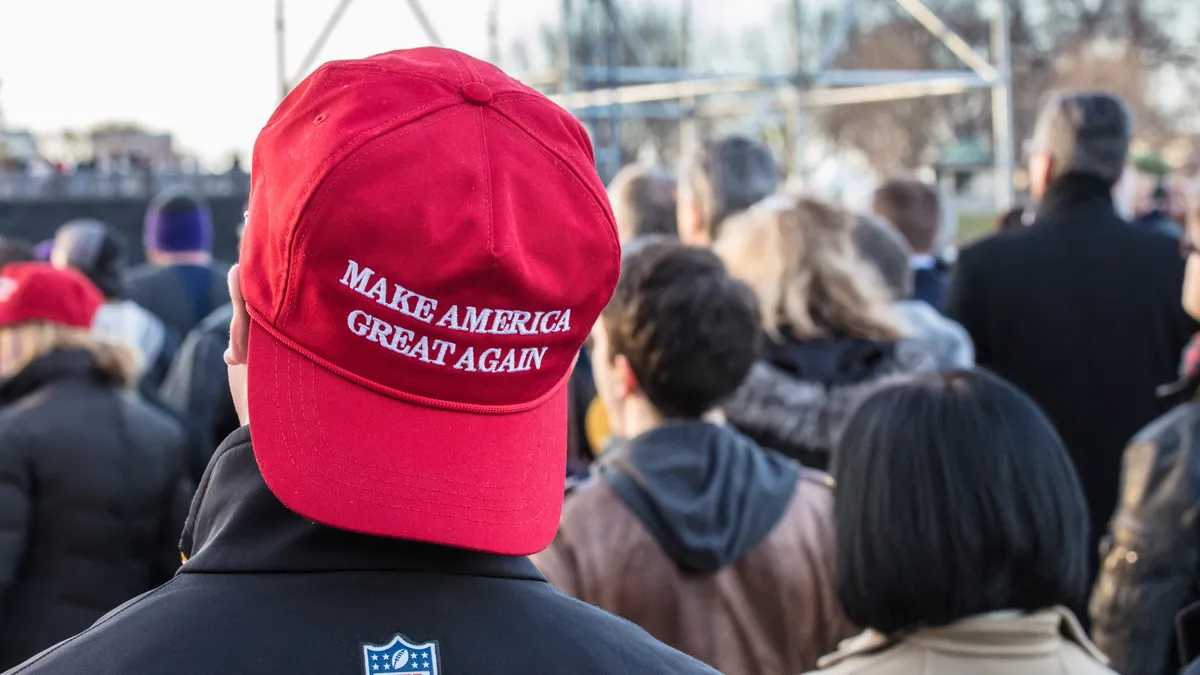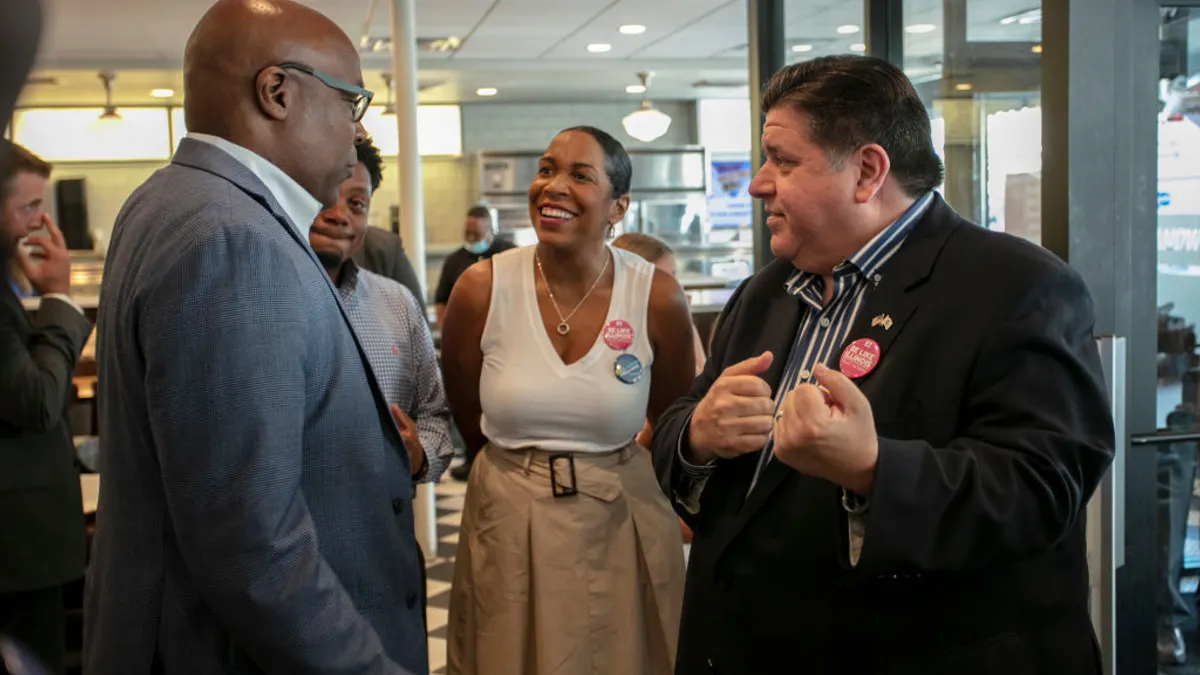As the U.S. dives into an election cycle during which presidential candidates will compete with a pandemic for attention, employers can be sure of one thing: political speech will make its way into the workplace.
When workers get political, how can employers respond? Two federal laws, Title VII of the Civil Rights Act of 1964 and the National Labor Relations Act (NLRA), offer some guidance, according to Randy Coffey, Fisher Phillips partner, and Steven Bernstein, co-chair of Fisher Phillips' labor relations practice.
It's OK to curb political speech
Employees' political discussions and actions at work create risk for employers, Coffey said. Employers may want to discourage on-the-job politics, then.
"There's some incentive in my view for employers to think carefully about making clear to everybody that maybe work isn't the best place to have intense political or social discussions, although it's also difficult to stop," Coffey said.
Bernstein echoed Coffey's sentiment, noting that employers may want to regulate political speech in the workplace for "a host of reasons" — productivity, emotion and conflict among them.
But curb it evenly and carefully
As employers consider how to discourage political activity in the workplace, they need to ensure they do so evenly, both Coffey and Bernstein warned.
Title VII requires that individuals in protected groups be treated in an equal fashion. Specifically, it prohibits discrimination on the basis of race, sex, national origin, color and religion. "So the key things for employers to keep in mind, if you're imposing discipline, is to be sure that you're doing so in an even handed manner," Coffey said.
If an employer has a dress code, for example, it needs to ensure the dress code is enforced evenly. An employer may allow workers to wear shirts — or, in these times, masks — expressing support for one presidential candidate. That's fine, but "if there are individuals in protected groups expressing another view, you can't single them out with some kind of disciplinary action," Coffey said. Adverse employment actions, Coffey emphasized, make up one of the key elements of Title VII claims.
Employers can apply this logic to work-area paraphernalia such as pictures, posters, buttons and signs, as well. As they craft policies that regulate such workplace adornments, they may consider what is appropriate for the workplace, rather than specific kinds of items. "They need to distinguish between speech that's motivated by protected characteristics and the like if they're not going to apply that even handedly across the board," Coffey said.
While Title VII compels employers to craft and enforce fair policies, the NLRA illuminates the kinds of political speech that employees have a right to make.
At the heart of the NLRA is Section 7, which is "essentially the bill of rights for employees under the NLRA." Section 7 applies to all employees in the private sector, regardless of their union status, a fact that often surprises employers, Bernstein said. It gives employees the right to act together for purposes of collective bargaining or other mutual aid or protection, he said.
Not all political speech triggers these protections. In fact, "very little of it does," Bernstein said. "The NLRA recognizes that employers have a right to regulate such speech at least during work time, but not if it ends up encroaching their Section 7 rights," he said. The mutual aid or protection piece of Section 7 is what political speech sometimes triggers.
A worker may arrive one day excited to share the news that a candidate pledged to raise minimum wage. The employee may chat up co-workers about the news in a way that touches on their own working scenario. That conversation may constitute Section 7 activity if there's evidence that the issue at hand established a shared concern, Bernstein said.
"That's how you get this blur of political speech and protected speech," Bernstein said.
It's important to note that the NLRA has "a parallel set of principles" dealing with workplace solicitation and distribution.
Employers can prohibit solicitation during working time, defined as the time the employer pays people to work. But a worker may lobby others to volunteer for a political campaign or sell political paraphernalia during a break — even a paid break. "The NLRA expects employers to focus on when it's happening," Bernstein said.
When it comes to distribution, employers ought to focus on where it's happening, not when, Bernstein said. Distribution, which occurs when employees engage in solicitation involving something on paper, is allowed to take place in non-working areas.
As employers institute and revise policies regulating political actions in the workplace, they need to be careful because rules have shifted in recent years. The National Labor Relations Board (NLRB), which enforces the NLRA, tends to shift priorities with presidential administration changes. "The pendulum has swung since Obama," Bernstein said. "We don't know where we'll be in six to nine months' time when the general elections are behind us."
Despite the constant evolution of this area of the law, employers can rely on a few principles. First, employers must be sure to apply their policies evenly, Bernstein said. Second, policies need to be clear, consistent and specific. "The NLRB is more concerned with policies that are vague in their restrictions, that they could be construed as obstructing Section 7 rights."
Ensure a safe, respectful workplace
There's an underlying issue at hand when it comes to politics at work. "It's less to me about politics and more about how employees treat one another at work," Bernstein said. "We want employees to treat each other with the respect they want to be treated with."
Coffey expressed similar concern. "It may very well be that it's a losing battle to stop social or political discussions at work, but you can remind your employees that the company's policies relating to non-discrimination and respectful workplaces still apply," he said. Employers may encounter the potential for Title VII claims if workers feel at ease making comments to co-workers in protected classes about their protected characteristics or their interest in advocates for protected groups.
"Those things can get out of hand and become the basis of a hostile work environment claim," Coffey said. "I think, frankly, that's the bigger risk."
Employers with politically diverse workforces may want to take note. "For employers in that situation, they might be well advised before we get really close to the election to remind employees that they expect compliance with their non-discrimination and no harassment and respectful workplace policies," Coffey said. "I think that will serve them well in the long run."





















